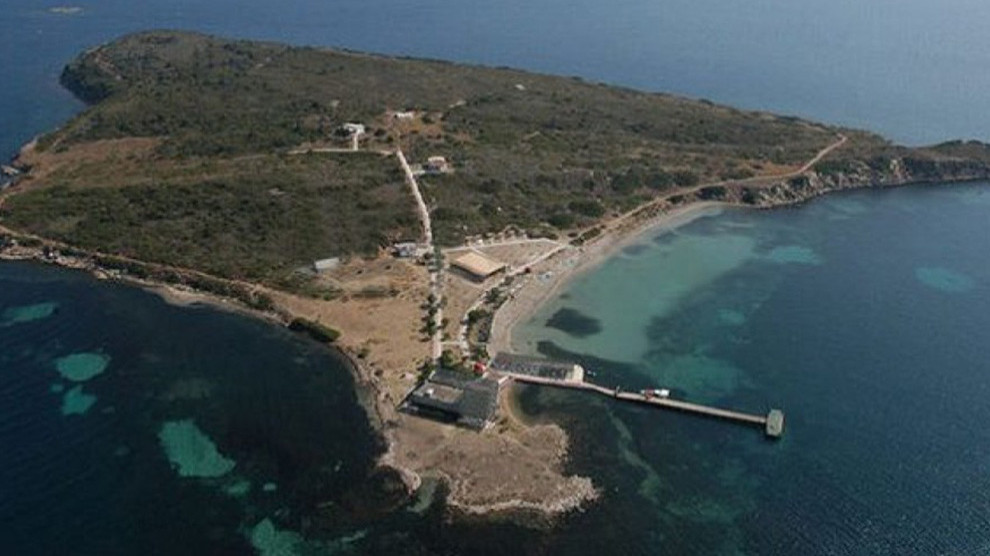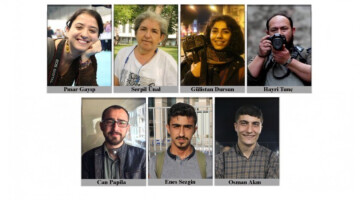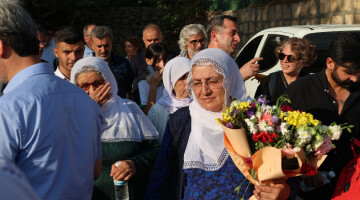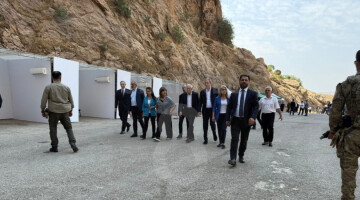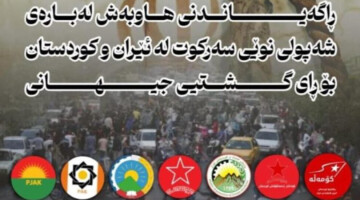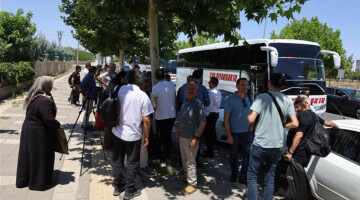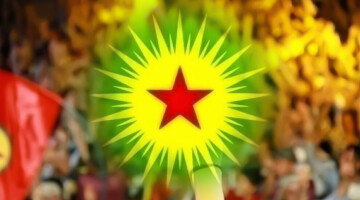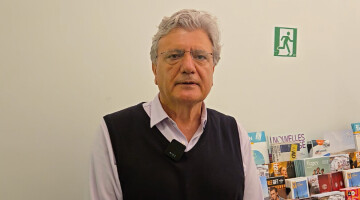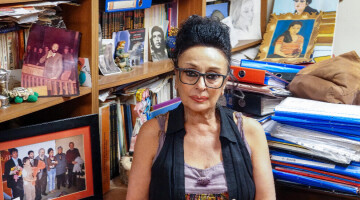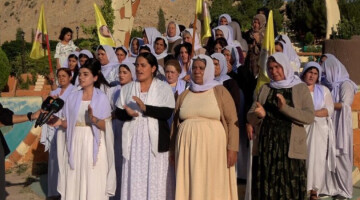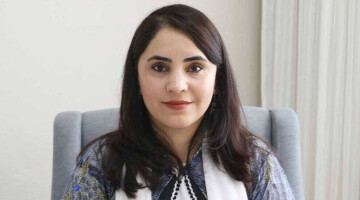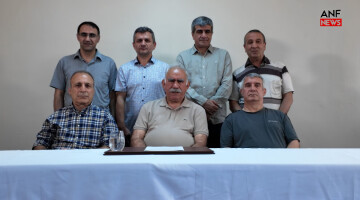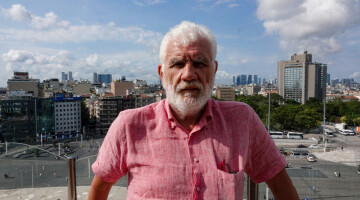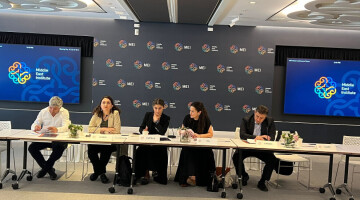Today, the 4th of April is Abdullah Öcalan’s 71st birthday. Below, we publish the contribution of one of his lawyers, Newroz Uysal, from the Istanbul Legal Office Asrın at the 16th international conference “The European Union, Turkey, the Middle East and the Kurds” in Brussels at the beginning of February. She describes the isolation conditions of her client Abdullah Öcalan and the connection between his isolation on Imralı, the democratisation of Turkey and the struggle for democratic rights by Kurdish society.
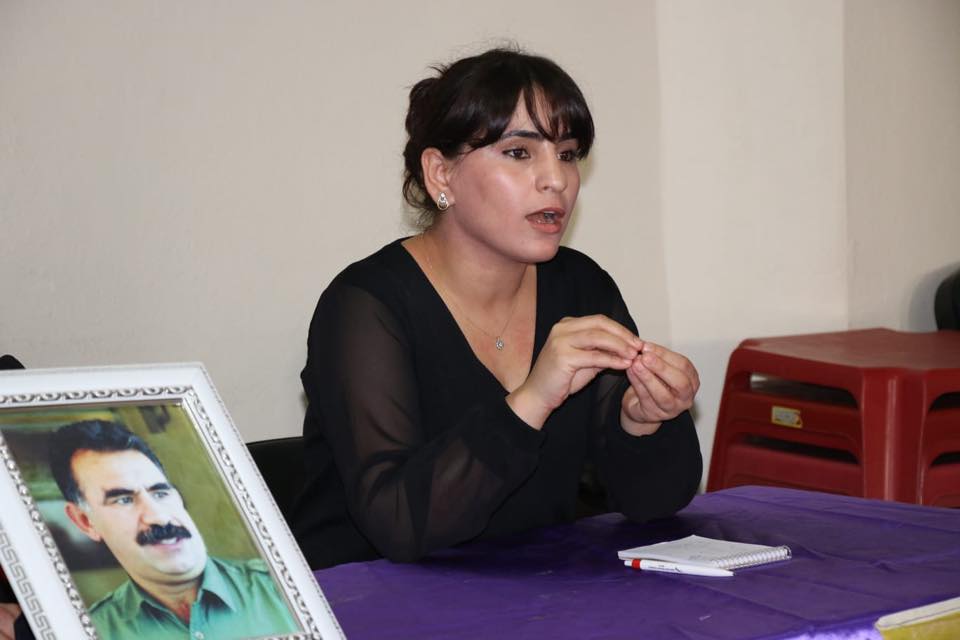
Dear participants,
I am pleased to participate in this now 16th conference and I would like to welcome you all on behalf of the Asrın Law Office. On February 15, Mr. Öcalan will have been imprisoned for 21 years on the prison island Imralı. We have all experienced that during these 21 years, within the framework of the isolation system Imralı, which has been constantly changing, developing and intensifying over time, on the one hand law has been defined by arbitrariness and irregularities, while on the other hand politics has been shaped by interest-led approaches.
Imralı contradicts the prohibition of torture
With the manner of arrest, trial, conviction and execution of sentences, Imralı is arbitrary and violates both universal legal norms and Turkish legal regulations. The Imralı system is characterized by measures that are surprisingly different from comparable examples all over the world. Since it is specifically designed as an island for one person, it also has a spatial dimension. The special features are not due to legal, but to political motives; consequently, this is a political issue. The island prison of Imralı is the first of its kind to be an exception. Since the transfer of Öcalan to Imralı, every order on the island can be described as systematic, because it is constantly being developed in a planned manner and as a whole. The measures applied are varied, replaced or tightened depending on the outcome. The basis of the system is not the granting but the restriction of rights. This system is maintained 24 hours a day, 7 days a week, without interruption. Because of its effects on the body, health and psyche of human beings, the system of incommunicado detention is also completely contrary to the prohibition of torture.
The Imralı system of isolation began with a violation of international law, illegal arrest and detention and violation of the right to a fair trial and the right to defence. Then a complete isolation was established, Mr. Öcalan was held for 10 years all alone. He was not allowed to exercise his right to telephone calls, nor did he receive the letters sent to him; and he was denied access to newspapers, television and other media. Family visits, which occupy a special place among the rights, have been restricted or even denied in most cases, while denial of lawyer visits has become a consistent practice. Eventually, Imralı prison became a place that could not be entered by a single lawyer for 8 years.
Imprisonment until death
Although the death sentence imposed on Mr Öcalan was overturned during Turkey’s EU accession process in accordance with legal harmonisation, he was not given a “fixed term of imprisonment” but a “life sentence to death without possibility of parole”. To this end, the existing legislation was amended, primarily by introducing a “more severe life sentence”. In its judgment of 18 March 2014, the ECtHR [European Court of Human Rights] ruled that the quality of this prison sentence violates the prohibition of torture. However, this did not lead to Turkey changing its national legislation.
Solitary confinement is everybody’s business
Taking into account the historical background as well as the recent developments, both of which are outlined below, it should be noted that Mr. Öcalan’s imprisonment and solitary confinement is not only of concern to Kurds and/or Kurdish politics, but to all those who support the aspiration for freedom of the peoples of the Middle East. The parallelism between the circumstances of Öcalan’s isolation, which has worsened in the last 7 to 8 years, and a period of extraordinary volatility in the Middle East tells us a lot. The establishment and continuation of the Imralı system is a result of the impasse in which the Turkish state finds itself regarding the so-called Kurdish question. The recent predictions and warnings of Mr. Öcalan have been heard by all parties involved. At a time when the Middle East has turned into a sea of blood, Mr Öcalan, in an attempt to contribute to a solution, has proposed a local, peaceful and reasonable approach for the peoples of the region. This approach has become the target of the ruling power elites. Their attack is backed up by an international conspiracy and incommunicado detention.
Internationalisation of the so-called Kurdish question
At present, crises are occurring all over the world, for different reasons and against different backgrounds. At the end of the first quarter of the 21st century, the Middle East is seen as the source of unfolding chaos. This crisis is an expression of the plight of the anti-democratic conception of the nation state that has been spread around the world by the shifting hegemonic powers. After the two world wars, Europe developed a democratic style based on negotiation, creating new administrative, political and governmental mechanisms. In the Middle East, however, the crisis continues in the form of a protracted Third World War. From Afghanistan to Kurdistan to Libya, the last 21 years have seen millions of deaths and other losses and devastation.
The developments that have been described as the internationalisation of the so-called Kurdish question are in reality an exact reflection of the cause of the problem. Under the tutelage of four different nation states, Kurds have been subjected to assimilating, annihilating and even genocidal policies. When Syria, Iran, Iraq and Turkey resorted to violence, they did not do it on their own but with the permission of the international community. Certainly, there are also numerous examples of freedom struggles throughout history that show the refusal of the Kurds to accept the status quo as their fate. With reference to the “right to self-determination”, Kurds have shown their determination to exist as a people, also through their contribution to the democratization of the nation states where they are threatened by genocide. The strongest expression of this will has manifested itself in Öcalan’s ideas themselves. Mr Öcalan therefore declares that he sees himself as the “will of the free Kurd”.
For peace based on dignity, democracy and freedom
In its philosophical, sociological, ethical, political, historical and other aspects, Öcalan’s findings on the so-called Kurdish question are accurate and comprehensive. Just as his proposals for solving the problem have a local and regional focus, they are also worthy of discussion on a global level. In 1992-1993, Mr. Öcalan expressed that his efforts were guided by the demand for “a democratic political solution, a peace based on dignity, democracy and freedom”, and he did the same. He declared several unilateral ceasefires, made various declarations and participated in many meetings aimed at finding a solution. Finally, in the face of a threat of war which arose immediately after his call for peace and a solution to the conflict on 1 September 1998, Öcalan was forced to leave Syria on 9 October 1998. He decided to go to Europe to pursue a democratic solution by political means.
International conspiracy instead of peace
He asked Europe to support his efforts for a democratic solution and peace. But instead of responding to the request, an international conspiracy was organised against him. Nevertheless, he never gave up his efforts for a political solution and peace. He realized how urgent the demand for peace had become; and by developing his thoughts into an even more energetic and carefully reasoned worldview, his influence increased. Regional forces positioning themselves as supporters of the status quo and international forces with their hegemonic interests are equally responsible for the continuing chaos in the Middle East, which continues to be shaken by crises and wars. Meanwhile, the Kurds have begun to focus on bringing their own capacity for reconciliation to the outside world. Indeed, the developments in the Middle East have given Kurds a decisive role in the region and made the solution of the so-called Kurdish question a task of international importance. Besides the attitude of the Kurds, the current situation also forces us to reconsider the role of Mr. Öcalan. Before and during his imprisonment on the island Imralı he has often enough demonstrated his ability to make reasonable and realistic proposals based on historical awareness to solve the problem.
Invasion as a continuation of the conspiracy
Looking at both the historical and the recent developments, it can be seen that the Kurds are used as a mean of blackmailing and negotiations to integrate the four states in which they were divided by the capitalist world system (Turkey, Iran, Iraq and Syria). Against this historical-political background, the purpose of the international conspiracy organised against Mr. Öcalan on October 9, 1998 is evident, namely to provoke a Kurdish-Turkish war – with no way out and no hope for a solution – and to force the two weakened sides into a dependent position. The occupation attack on Northern Syria on 9 October 2019, the anniversary of the conspiracy, must be seen as a demonstration of the desire to continue this same policy. Mr Öcalan himself has repeatedly pointed out that the plot and his solitary confinement are a clear reflection of the war policy. Today, the world’s focus is on Syria, particularly northern and eastern Syria. While these areas have been the stage for recent developments, the tensions and contradictions in Iraq, Iran and Turkey also play an important role. Turkey’s policy in Syria is directly related to the so-called Kurdish question. Considering that this policy is one of war and blockade, we can identify it as the trigger for the recent wave of death, destruction and loss, for the refugee movements and for the crises in the field of migration and asylum. Nevertheless, if the necessary will is shown in Turkey, a solution to the so-called Kurdish question could be achieved on a basis of dialogue and politics. In his direct and indirect relations with the state, Mr Öcalan has tried to develop a solution-oriented point of view; he has put a lot of work into it and called on everyone to open up to democratic peace. However, on the international stage, the political and human rights mechanisms disregard the efforts to find a solution and to achieve peace that Mr Öcalan made before and after his imprisonment on the island Imralı; they prefer to continue to call him a “terrorist”. In legal terms, this behaviour has encouraged arbitrary agreements and practices that further exacerbate the solitary confinement on Imralı and the incorporation of anti-democratic principles into the Turkish Constitution and legislation.
Visitor ban only briefly broken
Within the framework of the arbitrary and illegal isolation system of Imralı, the legal representatives were not able to pay a single visit to their client for a period of 8 years from 27 July 2011. During last year’s conference, we intensively discussed and followed the hunger strikes and death fasting of thousands of people, which finally led to Mr. Ocalan being allowed to be visited by his lawyers. A total of five visits could take place; the first visit on 2 May 2019 was followed by further visits on 22 May, 12 June, 18 June and 7 August. Since 7 August, however, Öcalan’s lawyers have again been barred from seeing their client, and their respective appeals have not even been answered.
Again, proposals for solutions
During the first of these visits, Mr Öcalan made his views known to the public in a seven-point statement, including suggestions on topical issues. However, the statement, which he himself refers to as the “Imralı attitude”, is also a sufficient source to show his views. Briefly outlined, it includes the following contents:
1. the need for social reconciliation,
2. the need to launch democratic negotiations,
3. a soft power solution to the problems of Turkey and the region, in particular the ongoing war
4. a solution to the problems in Syria from the perspective of a constitutionally guaranteed local democracy while maintaining Syria’s territorial integrity,
5. opposition to the continuation of hunger strikes,
6. determination to stick to the Newroz Declaration of 2013
7. a solution based on humane peace and democracy.
Also during the four meetings that followed this declaration resulting from the first visit, Öcalan assessed the dimensions and the probable development of the expected war in the Middle East, thus once again proving its importance for conflict resolution. In the context of what is called “Third Way” in Kurdish politics, he made clear that a democratic constitutional solution is the cornerstone of a democratic and common future of the peoples. During our fifth and last meeting on 7 August 2019, Mr. Öcalan pointed out the probability of war and reiterated his concern to prevent such a scenario. He underlined his competence to bring about an end to violence and a democratic constitutional solution to the so-called Kurdish internal question and assured: “Give me one week and I will remove the danger of conflict. Within one week I can pave a way to solve the problem; I am confident that I will prevent the conflict”. But neither, as Öcalan himself admitted, was the state reasonable to his demands; the state continued its attacks. Nor did the international community respond as it had hoped. As the war continues to have more and more devastating consequences every day, Mr Öcalan is also sticking to his call for a peaceful solution and his offer to make his contribution.
The Imralı system as prototype
For this and many other reasons, it would be a mistake to consider the Imralı system of isolation in the 21st year alone as a problem of Turkish prison policy. This system is not simply an aspect of human rights and democracy issues in Turkey, but its cause. The Imralı system is a prototype: the experience and knowledge gained from this changing and developing system, which is continuously, uninterruptedly and purposefully enforced, is being used in various areas using the same techniques. In other words: We should not perceive Imralı as a single violation of human rights, but as an exact symbol of the state of law and democracy in Turkey.
Speaking about Mr Öcalan’s freedom
In the name of a political and democratic solution of the so-called Kurdish question and a peace process in the Middle East, the European Union should take a stand and dissuade Turkey from the use of solitary confinement. If in the past there had been support for a democratic solution to the so-called Kurdish question, Turkey’s record on human rights, democracy and the rule of law would clearly be better today. A peace process should be seen in a historical and political perspective in order to prevent history from repeating itself. That is why today we would like to ask all democratic institutions, civil society organisations, political parties and their bodies, especially those taking part in this conference, to talk in their work about ending Mr Öcalan’s isolation and, finally, about his freedom.

